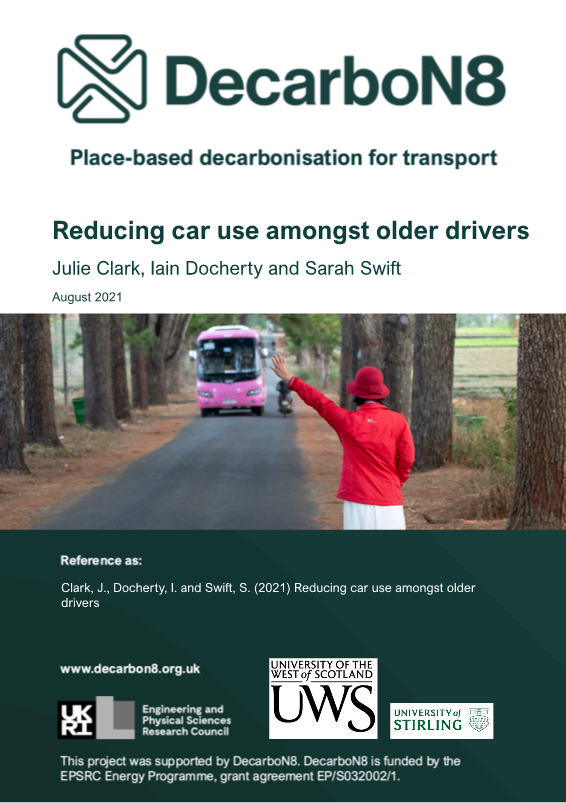Report: Reducing car use amongst older drivers
Authors: Julie Clark, Iain Docherty, Sarah Swift (2021)
PDF (23 pages, 1 MB)
A pilot study exploring potential means to support older people to reduce their car use. This group is under-represented in behaviour change research in transport, which often focuses on delaying the take up of driving or other critical stages in the life course such as having children. Research into how this can be achieved for older drivers is not only a necessary component of informing wider car use reduction behaviour change strategies, but also that older age groups have a crucial role to play in signalling the need for change to others.
Key Findings
This project comprised a pilot study exploring potential means to support older people to reduce their car use. This group is under-represented in behaviour change research in transport, which often focuses on delaying the take up of driving or other critical stages in the life course such as having children. Indeed, research on older drivers is largely dominated by work exploring the potential negative impacts on their physical and mental health of driving cessation. Nonetheless, given the demands of the climate emergency and the scale of the requirement to reduce car use implied in any credible decarbonisation pathway, all sections of society will have to change their travel behaviour, at least to some extent. It is our contention that research into how this can be achieved for older drivers is not only a necessary component of informing wider car use reduction behaviour change strategies, but also that older age groups have a crucial role to play in signalling the need for change to others. This pilot study report highlights what is likely to be necessary to support decarbonisation effectively:
- Policies need to consider socio-economic and demographic factors as well as the level of urbanisation, accessibility and environmental quality.
- Our participants demonstrated a broad range of different decarbonisation behaviours; however, their activities are not necessarily associated with a particular/self-declared interest in the environmental impact of driving, suggesting that there may be greater societal readiness for change than might generally be assumed.
- The results offer insight into the extent of change still required to make lower carbon choices more convenient and realistic, even for people with committed environmental interests.
- Our interviews with older adults explored how mobility needs change over the life course, including continuing, complex obligations to others and shifting contexts for travel more generally in later life.
- The relationship between planning and land use is identified as a central issue, but the quality of public transport and active travel options also come under scrutiny.
- Primarily, participants stressed the need for infrastructure improvements, including effective enforcement of safer behaviour on the roads.
- The value of emphasising economic and health benefits in lower carbon options is also advocated, as is simplifying and reducing the time and cost of using public transport.

